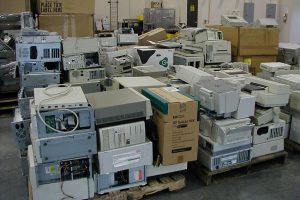
Sustainable Electronics Recycling International (SERI), which oversees the R2 electronics recycling standard, last week posted a 2018 Strategic Plan setting out its goals and actions over the next five years.
The outline spells out steps SERI will take under three broad categories: maximizing conformance with R2, boosting responsible electronics recycling around the world through other strategies, and measuring and conveying SERI’s impact to stakeholders.
When it comes to increasing certified facilities’ conformance to the standard, SERI is planning to expand training opportunities. The group is also looking to evolve its “spot audit” program (for example, determining the best course of action when an unannounced inspection finds a facility out of compliance) as well as explore using GPS tracking devices.
Further, the document notes the group wants to refine when and how SERI strips away R2 certification from nonconforming sites, with a goal of minimizing the risk of major legal costs. A number of other plan provisions relate to strengthening communications, training, feedback and oversight for auditors.
“Longer term, the Plan calls for evaluation and potential implementation of a database that would enable SERI to track the performance of certified recyclers,” according to a newsletter write-up about the plan.
Basel Action Network (BAN), the advocacy group that founded e-Stewards, began using GPS trackers to monitor the movement of scrap electronics in 2014. The practice is part of the group’s e-Trash Transparency Project. The trackers are now also used by administrators of e-Stewards, the other major U.S.-based electronics recycling standard, to verify compliance with e-Stewards requirements around shipping devices to downstream vendors.
As far as growth of R2 is concerned, SERI will develop a plan for rolling out R2 worldwide, with an initial emphasis on Southeast Asia. At its biannual meeting in February, the SERI board began planning for an office in Southeast Asia, likely Singapore.
SERI also wants to grow R2 by identifying existing and new accreditation and certification bodies in key regions. The current priorities regions are Asia, Latin America and Australia.
More than 700 facilities are now certified to R2. E-Scrap News in November took an in-depth look at the standard and plans for growth.